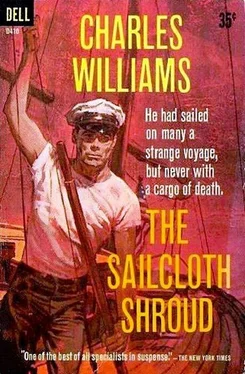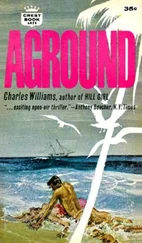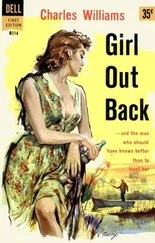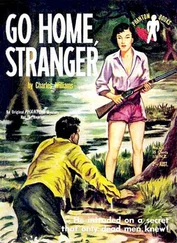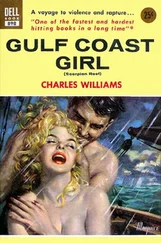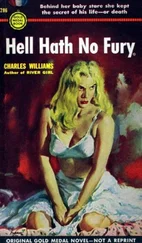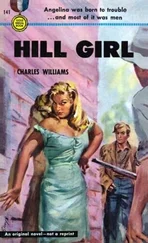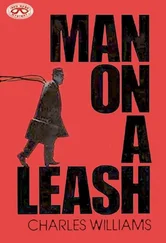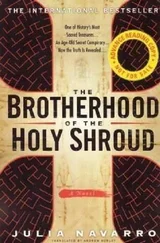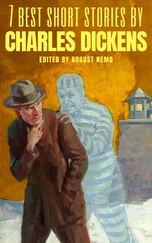Charles Williams - The Sailcloth Shroud
Здесь есть возможность читать онлайн «Charles Williams - The Sailcloth Shroud» весь текст электронной книги совершенно бесплатно (целиком полную версию без сокращений). В некоторых случаях можно слушать аудио, скачать через торрент в формате fb2 и присутствует краткое содержание. Год выпуска: 2010, Жанр: Старинная литература, на английском языке. Описание произведения, (предисловие) а так же отзывы посетителей доступны на портале библиотеки ЛибКат.
- Название:The Sailcloth Shroud
- Автор:
- Жанр:
- Год:2010
- ISBN:нет данных
- Рейтинг книги:3 / 5. Голосов: 1
-
Избранное:Добавить в избранное
- Отзывы:
-
Ваша оценка:
- 60
- 1
- 2
- 3
- 4
- 5
The Sailcloth Shroud: краткое содержание, описание и аннотация
Предлагаем к чтению аннотацию, описание, краткое содержание или предисловие (зависит от того, что написал сам автор книги «The Sailcloth Shroud»). Если вы не нашли необходимую информацию о книге — напишите в комментариях, мы постараемся отыскать её.
The Sailcloth Shroud — читать онлайн бесплатно полную книгу (весь текст) целиком
Ниже представлен текст книги, разбитый по страницам. Система сохранения места последней прочитанной страницы, позволяет с удобством читать онлайн бесплатно книгу «The Sailcloth Shroud», без необходимости каждый раз заново искать на чём Вы остановились. Поставьте закладку, и сможете в любой момент перейти на страницу, на которой закончили чтение.
Интервал:
Закладка:
“There was also mention of another man I don’t know anything about at all. Slidell. Maybe somebody’s heard of him. I’ll be in Miami as soon as I can get there. See if you can find out anything at all.”
“Right. Take it easy, sailor.”
Packing was no problem; I hadn’t unpacked. I called the desk to get my bill ready and send for a cab. The lobby was empty except for the clerk. I settled the bill and was putting away my change when the taxi driver came in and got the bag. We went out. It was growing light now. The street had been washed, and for this brief moment just at dawn the city was almost cool and fresh. I looked up and down the street; there were no pedestrians in sight, and only an occasional car. “Airport,” I told the driver, and we pulled out.
I watched out the rear window, and just before we reached the end of the block I saw a car pull out from the curb behind us. It had its lights on, so it was impossible to get an idea of what make it was, or what color. Two blocks ahead we turned to the left. The car—or another one—was still behind us. I kept watching. For a time there were two, and then three, and then we were back to one again. There was no way to tell if it was the same one, but it always stayed the same distance back, about a full city block. We made another turn, picking up the highway leading out of town, and it was still there.
I began to worry. The airport was pretty far out, and there were no doubt plenty of deserted stretches of road where they could force us off if they were after me. My only chance—if I had any—would be to jump and run for it. I’d have to warn the driver, though. If he tried to outrun them, they’d probably kill him. The minute I saw them start to close in, I’d tell him to stop.
Then, suddenly, they turned off and we were alone. After another mile with the pavement completely empty behind us I heaved a sigh of relief. False alarm. I was too jittery.
Hell, they didn’t even know I was at the hotel; nobody had followed us when I came uptown from the boatyard.
Then I realized I was a baby at this sort of thing and that I was up against professionals. Maybe they had been following us. By the time we’d reached the place where they had turned off it was obvious where I was headed so they no longer had to stay in sight. It could have been the same thing when I came up from the yard. They’d merely called the hotels until they located me; there probably weren’t over half a dozen. I felt ridiculous and stupid, and a little scared.
If they were after me, what was the best plan? I remembered what Willetts had said—they’re all afraid of witnesses. Then stay in the open, surrounded by plenty of people, I thought. We left the city behind, rolling through the outlying housing developments, and crossed a bayou overhung with dark liveoaks and dangling pennants of Spanish moss. The sun was just rising when we pulled up in front of the airport passenger terminal. I paid off the driver and went inside with my bag.
It was a good-sized terminal, busy even at this hour in the morning. Long windows in front looked out toward the runways, and at either end were the concourses leading to the gates. To the left were some shops and the newsstand and restaurant, while all the airline counters were strung out along the right. I went over, checked in, and paid for my ticket.
“Thank you, Mr. Rogers,” the girl said. She clipped my luggage check to the boarding pass and gave me my change. “Concourse B, Gate Seven. The flight will be called in approximately ten minutes.”
I bought a newspaper, moved back to a leather-cushioned bench, and sat down to sweat out the ten minutes. If they were following me, they’d try to get on this flight, or at least get one man on it. I was just in back of the two lines checking in. I looked them over cautiously while pretending to read the paper. There was a slight, graying man with a flyrod case. Two young girls, who might be teachers on vacation. An elderly woman. A fat man carrying a briefcase. A Marine. Two sailors in whites. A squat, heavy-shouldered man carrying his coat over his arm. My eyes stopped, and came back to him.
He was at the head of the line now, in the row in which I’d checked in. He would have been about two places behind me, I thought. The girl was shaking her head at him. I strained to hear what she was saying.
“. . . sold out. We’d be glad to put you on stand-by, though; there are still about four who haven’t checked in.”
He nodded. I could see nothing but his back.
“Your name, please?” the girl asked.
“J. R. Bonner.”
The voice was a gravelly baritone, but there was none of the rasp and menace there’d been in the other. Well, why should there be, under the circumstances? You couldn’t tell much about a voice from one or two words, anyway. I glanced down at his shoes. They were black, size ten or eleven, but I was a little to the left and couldn’t see the outside of the right one. I returned to my paper, pretending to read. In a moment he turned away from the counter. I looked at him in the unseeing, incurious way your eyes go across anyone in a crowd.
Aside from an impression of almost brutal strength about the shoulders and arms, he could have been anybody—line coach of a professional football team, or the boss of a heavy construction outfit. He wore a soft straw hat, white shirt, and blue tie, and the coat he carried over his arm and the trousers were the matching components of a conservative blue suit. He was somewhere around forty, about five-nine, and well over two hundred pounds, but he walked as lightly as a big cat. His eyes met mine for an instant with the chill, impersonal blankness of outer space, and moved on. He sat down on the bench over to my left. I looked back at my paper. How did you know? What did appearances mean? He could be a goon with the accomplished deadliness of a cobra, or he might be wondering at the moment whether to buy his five-year-old daughter a stuffed bear or one of the Dr. Seuss books for a coming-home present. I glanced at his feet again, and this time I could see it. The right shoe had been slit along the welt for about an inch just under the little toe.
I folded the paper, slapped it idly against my hand, and got up and walked past him. He paid no attention. I strolled over and looked out the long glass wall in front at the runways and dead grass and the bright metal skin of a DC-7 shattering the rays of morning sunlight. It was a weird sensation, and a scary one, being hunted. And in broad daylight, in a busy, peaceful airport. It was unreal. But what was even more unreal was the fact that there was nothing I could do about it. Suppose I called the police. Arrest that man; he’s got a cut place in his shoe.
I wondered if he had a gun. There didn’t seem to be any place he could be carrying one unless he had it in the pocket of the coat slung over his arm. If he held it just right, nobody could tell. He had no luggage. And the chances were he was alone. With the flight sold out there wasn’t much percentage in more than one of them bucking the stand-by list. If he got aboard, he could keep me in sight until the others caught up. Well, he wasn’t aboard yet. Maybe he wouldn’t make it. They announced the flight. I walked out Concourse B, feeling his eyes in the middle of my back in spite of the fact that I knew he probably wasn’t even looking at me. Why should he? He knew where I was going.
Number 302 was a continuing flight, so there were only nine or ten people at Gate 7 waiting to go aboard. Some through passengers who had deplaned to stretch their legs were allowed to go through first. Boarding passengers went through single file while the gate attendant checked our tickets. I was last. As I went up the steps I resisted an impulse to look back. He would be watching from somewhere to be sure I went aboard. There were still four or five empty seats, but that meant nothing. Two would be for the stewardesses, and some of the through passengers might still be in the terminal. I took one on the aisle, aft of the door. There might even be people ahead of him on stand-by. I waited. I was on the wrong side to see the gate, even if I’d had a window seat. It was stifling with the plane on the ground. Sweat gathered on my face. Another passenger came aboard, a woman. Then one in uniform, an Air Force major. I began to hope. The captain and first officer came through the doorway and went forward. The door to the flight compartment closed. Then two minutes before they took away the ramp Bonner came through the door. He took the last empty seat.
Читать дальшеИнтервал:
Закладка:
Похожие книги на «The Sailcloth Shroud»
Представляем Вашему вниманию похожие книги на «The Sailcloth Shroud» списком для выбора. Мы отобрали схожую по названию и смыслу литературу в надежде предоставить читателям больше вариантов отыскать новые, интересные, ещё непрочитанные произведения.
Обсуждение, отзывы о книге «The Sailcloth Shroud» и просто собственные мнения читателей. Оставьте ваши комментарии, напишите, что Вы думаете о произведении, его смысле или главных героях. Укажите что конкретно понравилось, а что нет, и почему Вы так считаете.
